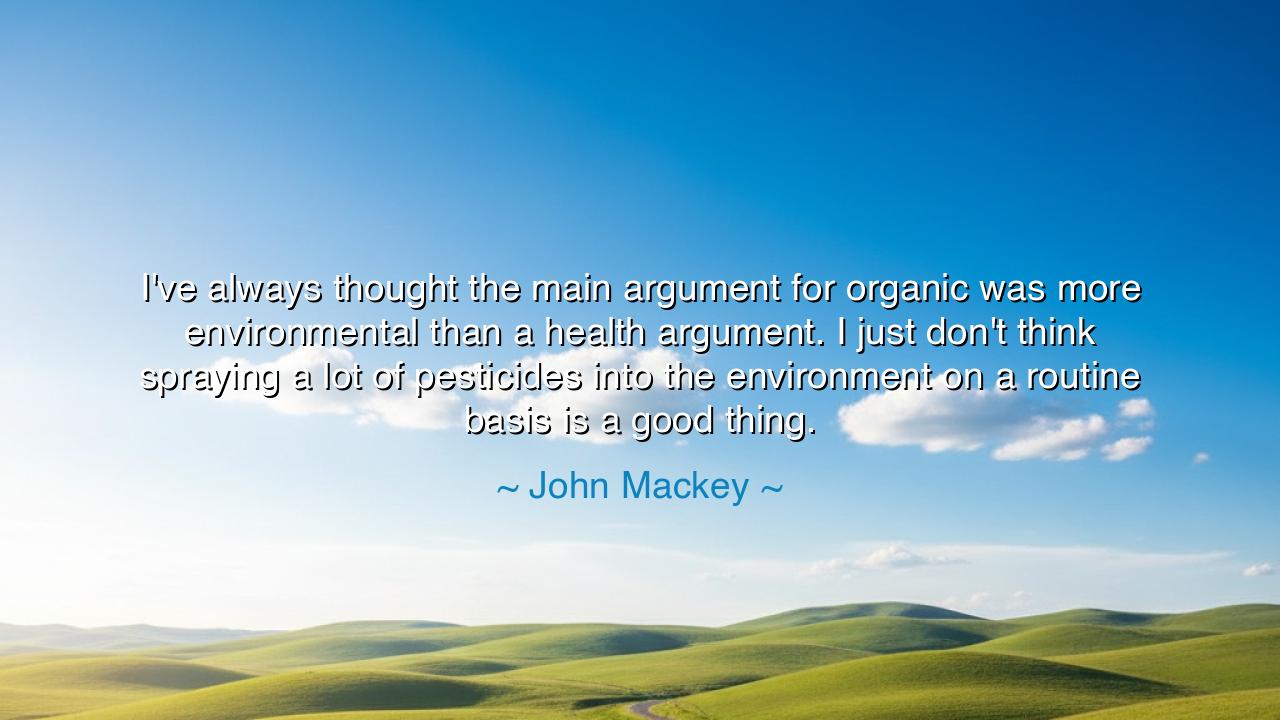
I've always thought the main argument for organic was more
I've always thought the main argument for organic was more environmental than a health argument. I just don't think spraying a lot of pesticides into the environment on a routine basis is a good thing.






Hear, O children of earth and seekers of wisdom, the words of John Mackey, who declared: “I’ve always thought the main argument for organic was more environmental than a health argument. I just don’t think spraying a lot of pesticides into the environment on a routine basis is a good thing.” In these words, spoken with clarity and conviction, lies a lesson for our time: that the care of the soil and the air is not merely for our bodies, but for the enduring balance of creation itself.
The meaning of Mackey’s words is rooted in perspective. Many defend organic food as a matter of personal health, claiming purity from chemicals, safety from toxins, or better nourishment. But Mackey points deeper: the true value of organic lies not only on the plate, but in the fields where it is grown, in the rivers that flow nearby, in the bees that pollinate, and in the children yet unborn who will inherit the land. His cry is not merely, “Do not harm yourself,” but rather, “Do not wound the world in which all life is cradled.”
The ancients understood this principle. The peoples of old practiced crop rotation, fallowing the land, and honoring cycles of rest. They knew that the soil, if treated only as a tool of endless extraction, would lose its vitality. But if honored, it would remain abundant for generations. To Mackey, the danger of pesticides lies not just in what touches the fruit, but in the invisible poison that leaches into waters, soils, and skies, weakening the living web on which humanity itself depends.
Consider the story of Rachel Carson, whose book Silent Spring in 1962 shook the world awake. She revealed how chemicals like DDT, sprayed without thought, did not vanish after killing pests, but lingered in rivers, accumulated in fish, and silenced the songs of birds. Her warning was not primarily about human health, but about the unraveling of entire ecosystems. It was her voice that first declared what Mackey repeats: that to drench the world with poison for the sake of convenience is folly, and that the greater argument for organic is the survival of the living earth.
There is also here a warning about habit. Mackey speaks of pesticides used “on a routine basis.” The true danger is not in a single spray, but in the endless cycle, normalized and unquestioned, until poison becomes as common as rain. In this, we see the peril of blindness: what begins as an occasional solution becomes a way of life, and what was once shocking becomes invisible. Only those who step outside the pattern—those who see the land as sacred—can remind the world of the madness of such habits.
The lesson, then, is profound: we must shift our gaze from the narrow circle of personal gain to the wide horizon of collective stewardship. The value of organic farming lies not only in feeding ourselves, but in protecting pollinators, in preserving soils, in keeping rivers alive. To choose organic, or to support farmers who nurture the land without chemicals, is not a private act of diet—it is a public act of preservation, a covenant with the earth.
Therefore, O listener, take heed of Mackey’s teaching. Do not ask only, “Is this food good for me?” but also, “Is this way of growing good for the world?” Plant what you can without poison, support those who farm with reverence, and teach others that every purchase, every meal, is a vote for the kind of earth we will pass down. For if the rivers run clean, if the bees hum, if the soil is alive, then health will follow. But if we poison the earth, no medicine will save us.
And so let his words endure: that the greatest argument for organic is not selfish but selfless, not about today’s meal but about tomorrow’s world. Let us rise, then, as guardians of the soil, rejecting the easy path of poison, and walking instead the harder path of care. For in that path lies not only survival, but the flourishing of creation itself.






AAdministratorAdministrator
Welcome, honored guests. Please leave a comment, we will respond soon